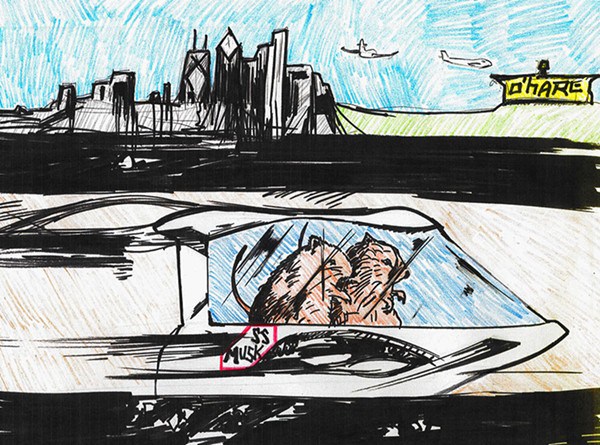As several experts, advocates, and observers have noted, Mayor Rahm Emanuel’s grand plan for luxury express transit service to O’Hare could be a costly distraction from Chicago’s more pressing transportation priorities.
In a nutshell, the express would be redundant to the existing Blue Line service, which could be made more attractive to visitors and business travelers via some relatively inexpensive upgrades. Since the express would run less frequently that the ‘L’, and possibly terminate in the West Loop rather than having several stops in the Loop proper, it might not offer a significant reduction in total travel time. That, along with projected $25-plus ticket prices, could make it hard to generate sufficient ridership.
And while the city has promised that no taxpayer money would be used for constructing the new route, it has acknowledged that public funds will probably be used to build the stations. It’s also likely that if the service isn’t financially sustainable, residents could be on the hook for covering the revenue shortfall. Regardless, the project is already diverting city planning resources from projects that would actually improve transit access for ordinary Chicagoans, such as strategies to speed up buses or create crosstown rapid transit.
The fact that tech guru Elon Musk is vying to build the O’Hare route with his excavation enterprise The Boring Company raises further questions about the viability of the initiative. Musk, who is in the habit of proposing projects using technology that doesn’t exist yet, and has stated that public transit “sucks,” has made the dubious claim that he has technology that can speed up the process of digging a tunnel 14-fold over conventional methods and cut costs by up to 90 percent, although he’s provided little evidence to back up this boast. Musk has stated that he will dig a tunnel from O’Hare to the Loop to whisk travelers to the airport via so-called “electric sled” technology.
The likelihood of Chicago entering into a contract with Musk to build the express became that much more real today as the city announced that the Boring Company is one of two finalists in the request for proposals process for the project to plan, build, finance, and operate the service. The Boring Company and O’Hare Xpress LLC will be eligible to respond to the RFP, which will be issued on Friday by the Chicago Infrastructure Trust, with responses to the RFP due on May 18.
The Musk-free competitor is a consortium that includes Meridiam, Antarctica Capital, JLC Infrastructure, Mott MacDonald and First Transit. The Chicago Tribune reported that Meridiam is a global investor based in Paris, while JLC is an infrastructure fund that was founded by basketball legend Magic Johnson JLC and Jim Reynolds, head of the investment firm Loop Capital Markets. Antarctica is a New York-based investment firm, and UK-based civil engineering company Mott MacDonald designed a terminal for Heathrow Airport in London.
“Strengthening connections between Chicago’s economic engines will drive our economy into the future, build on the city’s legacy of innovation and pay dividends for generations to come," Emanuel said in a statement. “Today, we have two teams that have the ability to get the job done and create an express connection between downtown Chicago and O’Hare Airport without a taxpayer subsidy."
“Of the submissions received, these two teams represent the best potential partners to deliver this express service, which will be a key part of Chicago’s continued economic growth,” Chicago treasurer and infrastructure trust chair Kurt Summers stated. A total of four companies submitted proposals.
The city’s announcement reiterated the claim that taxpayers won’t be responsible for paying the O’Hare Express, but instead all funding will come from fares, advertising, and other revenue sources, and the project will be financed entirely by the developer. However, ex-mayor Richard M. Daley previously blew some $250 million building the shell of a “superstation” for the O’Hare Express under the Loop's Block 37, which was never used. With Musk, who has generated plenty of hype but relatively few results when it comes to mass transit projects, in the finals, it’s even more likely that additional money will be wasted on this misguided dream.




